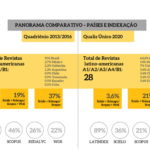José Aloyseo Bzuneck, Senior Professor at Londrina State University Londrina (UEL), Londrina, Paraná, Brazil.
In the article “University students profiles of self-regulated learning and motivation” published in the journal Estudos de Psicologia (Campinas, vol. 37), a Likert-type questionnaire, designated to assess learning strategies, mastery achievement goals, extrinsic goals, procrastination, and discipline valuation, was applied to a sample of 212 university freshmen students. Researchers at Londrina State University, following Zimmerman’s (2013) framework of self-regulated learning, found in these college freshmen students four different self-regulated learning clusters, or homogenous groups, distinguished by their engagement and application of learning strategies. The evaluation of learning strategies followed the microanalytical approach (BENBENUTTY, 2011), whereby the strategies had as reference the task of producing a Philosophy text, with specific compliance requirements. A cluster as “highly regulated” students was identified, given the significantly higher means in all evaluated learning strategies, compared to the other three groups. Students in another cluster revealed an opposite pattern, labeled as “low regulation”. Mixed scores in every strategy characterized the other two clusters. In each student and in each group, this person-centered methodology disclosed both strengths and weaknesses.
In an actual learning activity, motivational thoughts, such as achievement goal orientation, are necessary. In the present study authors found that all students, without significant differences among the four clusters, revealed a moderate level of orientation towards extrinsic goals, such as receiving good grades or recognition from the teacher. However, only “highly regulated” students exhibited significantly higher scores for the mastery goal. Students with this orientation try to develop their competence and to master the contents related to the task completion. The best quality of this motivational orientation is well documented in the literature (SENKO; HULLEMAN, 2013), whereby it has been linked to psychological outcomes such as preference for challenging tasks, persistence in the face of difficulty and deep learning strategies.
Thus, the present study adds to field of educational psychology because it illuminates relationships of self-regulated learning student’s clusters with qualitative differences in motivation. In other words, the level of students’ qualitative motivation for performing a specific task can explain some of the variance in self-regulated learning.
Since self-regulation and motivation are of general importance for college students’ learning, authors have called for educational training programs for beginning students in study skills, linked to efforts for the development and maintenance of motivational orientation towards achievement mastery goal. Finally, future investigations on other specific learning activities were proposed.
See below the vídeo in which Professor Bzuneck shows more details from the present study.
References
BEMBENUTTY, H. New directions for self-regulation of learning in postsecondary education. New Directions for Teaching and Learning [online]. 2011, no. 126, pp. 117-124, e-ISSN: 1536-0768 [viewed 8 April 2020]. DOI: 10.1002/tl.450. Avaliable from: https://onlinelibrary.wiley.com/doi/abs/10.1002/tl.450
SENKO, C. and HULLEMAN, C.S. The role of goal attainment expectancies in achievement goal pursuit. Journal of Educational Psychology [online]. 2013, vol. 105, no. 2, pp. 504-521, e-ISSN: 1939-2176 [viewed 8 April 2020]. DOI: 10.1037/a0031136. Avaliable from: https://psycnet.apa.org/record/2013-05299-001
ZIMMERMAN, B.J. From cognitive modeling to self-regulation: a social cognitive career path. Educational Psychologist, 2013, vol. 48, no. 3, pp. 135-147, e-ISSN: 1532-6985 [viewed 8 April 2020]. DOI: 10.1080/00461520.2013.794676. Avaliable from: https://psycnet.apa.org/record/2013-25567-001
To read the article, access
MERETT, F. N., et. al. University students profiles of self-regulated learning and motivation. Estud. psicol. (Campinas) [online]. 2020, vol. 37, e180126, ISSN 0103-166X [viewed 27 April 2020]. DOI: 10.1590/1982-0275202037e180126. Available from: http://ref.scielo.org/c9w8qx
External links
Estudos de Psicologia (Campinas) – ESTPSI: www.scielo.br/estpsi
http://periodicos.puc-campinas.edu.br/seer/index.php/estudos
About José Aloyseo Bzuneck
 PhD in School Psychology and Human Development from the University of São Paulo (1980). Post-Doctorate in Education, from the UNICAMP (2012). Currently is senior professor at Londrina State University Londrina (UEL), in Brazil. He has been investigating the relationship between self-regulated learning strategies and motivational constructs, using achievement goal theory and self-determination theory.
PhD in School Psychology and Human Development from the University of São Paulo (1980). Post-Doctorate in Education, from the UNICAMP (2012). Currently is senior professor at Londrina State University Londrina (UEL), in Brazil. He has been investigating the relationship between self-regulated learning strategies and motivational constructs, using achievement goal theory and self-determination theory.
E-mail: bzuneck@sercomtel.com.br
Lattes: http://lattes.cnpq.br/2005887658677506
Facebook: José Aloyseo Bzuneck
Como citar este post [ISO 690/2010]:



















Recent Comments